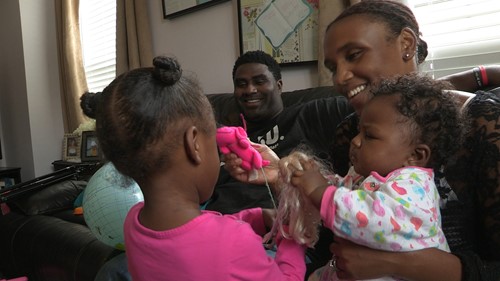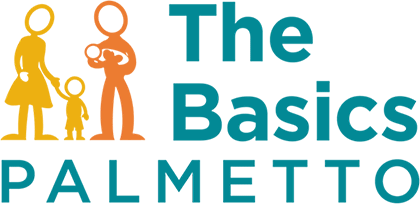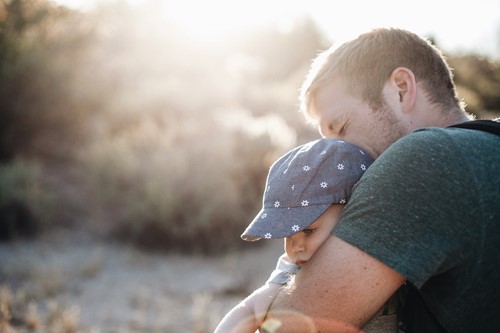We never thought we’d be here, did we? Parents in all kinds of work and parenting situations are suddenly forced to find solutions for challenges that didn’t exist even a week ago.
We’re here to help. The mission of the The Basics is to provide every parent and caregiver with simple ways to give children a great start in life. And while all 5 Basics are important, the very first Basic is the foundation for everything else: Maximize Love, Manage Stress. It’s also the foundation for our daily lives right now!

Are you supervising digital learning for older kids and / or possibly trying to keep younger children occupied?
Are you now working from home with children?
Do you still have to go to work and find alternative childcare?
Are you facing financial worry while trying to stay calm and steady for your children?
These are stressful times. Loving your children well while managing personal stress is the most important thing you can do right now. (Besides staying home of course!)
This is The Basic that serves as a foundation for all the rest. Maximizing love for your child prepares their young brain and body to learn, to adapt, to relate to others, and to thrive in all areas of life—both in a time of crisis and beyond.
FIRST, LET’S TALK ABOUT “MAXIMIZE LOVE” AND WHAT IT LOOKS LIKE IN EVERYDAY LIFE RIGHT NOW.
Children thrive when the world seems loving, safe, and predictable. This is true during everyday life in normal times AND during everyday life in times of crisis.

This can feel extra challenging for you as a parent or caregiver when the world feels especially unsafe and unpredictable. But you can provide these things for your child in simple, everyday ways. It’s not as complicated as you might think. (Remember, these are The Basics.)
Holding, kissing, and cuddling your young child helps them feel loved and safe. Simple, everyday routines provide a world for them that’s predictable and secure. Having consistent rhythms for eating, bathing, and bedtime helps children easily transition from one thing to the next because they know what to expect.
What does this look like right now?
1. Provide extra snuggles, hugs, and kisses.
When you respond to the needs of your newborn or toddler, you teach them that they can count on you. This helps them feel secure. Children, even babies and toddlers, can sense your stress and the anxiety level in your home.
2. Find simple daily rhythms that work for you and your family.
Predictability helps children feel secure. When they know what to expect, they are less likely to push back and negotiate. If you are at home with children, there are a variety of daily schedules circulating on social media. If any of those are helpful, use them. But having a schedule that’s too rigid can lead to more stress if your baby won’t nap or your toddler has a meltdown that throws everything off. We suggest a flexible daily routine instead of a rigid schedule.

Maybe your routine is loose and flexible and looks something like this:
- Set mealtimes—breakfast, lunch, dinner—around the same time each day
- Activity time in between—toys, go outside, read books, watch an age-appropriate show
- Afternoon rest time
- A bedtime routine—bath, read-aloud, goodnight
The times may not be exact. The activities may vary from day to day depending on weather, energy levels, etc., but there is some predictability to each day.
Maybe your routine is more structured and looks something like this:
- Wake up – breakfast – play with blocks or other building toys– play outside if weather allows – have read-aloud time – eat lunch – rest time – watch a 30 minute show – color or do crafts – have a snack – look at books while parents make dinner – watch a 30 minute show – bedtime routine: bath, read-aloud, goodnight
Do what works best for you and your family!
NOW LET’S TALK ABOUT “MANAGE STRESS” AND WHAT IT LOOKS LIKE RIGHT NOW.
You can’t avoid stress, especially during a time of crisis. But you can learn to cope effectively and teach your child to do the same.

In the same way that children thrive when the world seems loving, safe, and predictable, children suffer when their world is neglectful, unsafe, or chaotic.
As we’ve mentioned, young children are greatly affected by the stress of their parents and caregivers. Even babies can sense the stress of a parent. It’s crucial that you find healthy ways to cope with stress as you also care for your child. Not doing so can having a lasting effect on a young child’s brain, body, and emotions.
Here are some practical ways to manage stress as you face new challenges in daily life:
- Get enough rest. Sleep = sanity.
- Move your body. Stretching, yoga, going for a walk, doing a workout online. Movement boosts our body’s good hormones and provides endorphins!
- Get outside. Weather and space permitting, go outdoors. Nature provides peace and perspective. Sunshine and fresh air are good for the body and soul.
- Take breaks from media. The news, social media, and local forums have their place. It’s good to be informed from trusted sources. But mindless scrolling and taking in too much information in a culture of fear and alarm can add to your anxiety.
- Take a break from your phone and other devices. Put it in another room for a time. Studies show that stress levels decrease when we disconnect digitally. This will feel hard at the beginning; you might actually feel more anxious at first. But over time, this healthy habit will become life giving.
- Stay in touch with those you love. Call or text the friends and family you don’t get to see right now. Though you can’t be with others in the ways you’re used to, you can still reach out in ways that bring connection and comfort.
- Know that grown-ups need timeouts too. When you’re overwhelmed, when it’s only 11 am and the kids won’t stop fighting, it’s okay to step away and count to 100. It’s okay to leave them with your spouse or partner so you can walk around the block.
- Practice gratitude. Studies show that gratitude actually improves mental health; it’s a positive emotion that helps fight negativity. Perhaps you can begin each day listing 3 things you’re thankful for. If your child is old enough, teach them the practice of gratitude too!
Be kind to yourself. We’ve never been through something like this and we all need grace and compassion for ourselves and for others. Encourage the parents and caregivers in your life. Help them in any way you can, knowing that when you do, you’re helping children too.
One day normalcy will return. But let’s make the most of this time with the children who depend on us. Research shows that a solid foundation of love and security helps children focus, adapt to new situations, control their emotions, and begin school ready to learn.

The Basics are 5 fun, simple and powerful ways that every parent can give every child a great start in life!
Here are some resources that can help you on your journey:
- Watch this short video for encouraging ways that real parents are doing Basic #1, “Maximize Love, Manage Stress” in everyday life. Click on the tips at the bottom of the page for Infants 0-12 months and Toddlers 12-24 months.
- Receive regular, FREE resources from The Palmetto Basics.
- Follow The Palmetto Basics on Facebook and Twitter. We provide encouraging, real-life, shareable content to help parents and caregivers! And we’ll post specific resources that can help you during the coronavirus pandemic.
- If you, your faith community, your organization, or your place of business would like to join us as a Champion for Children, contact us! palmettobasics@gmail.com.
Thanks for sharing this post and spreading the word about The Palmetto Basics to those within your circle of influence!

